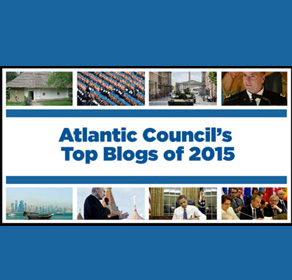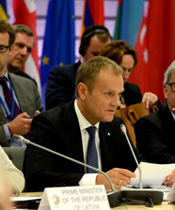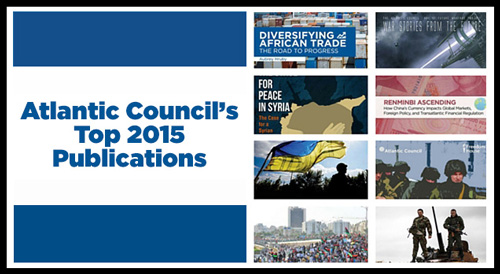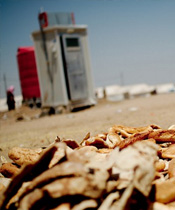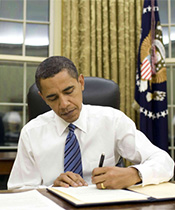
|
Radars for Ukraine: Obama’s Strong Signal To PutinBy Adrian KaratnyckyA day after US President Barack Obama met with Russian President Vladimir Putin, the United States announced that it will ship long-range counter-battery radars to Ukraine. Obama authorized $20 million to provide the country with radars, bringing US security assistance to Ukraine up to $265 million. Obama’s message is clear: the United States will not sacrifice Ukraine in exchange for Russian cooperation against Islamic State in Syria. [READ MORE] |
The Disastrous EU Summit on the European PartnershipBy Anders ÅslundThe European Union’s Summit on the Eastern Partnership, held May 21-22 in Riga, was a disaster for Ukraine. For friends of democracy, the rule of law, and Ukraine, it would have been better had this EU summit never taken place and its joint declaration never written. [READ MORE] |
|
 |
Qatar’s New Slavery MuseumBy Matthew HallHanging in Qatar’s museum of modern art are several works by Faraj Daham—nature scenes painted on the circular steel lids of oil drums. In the background of these paintings—literally and figuratively—is Qatar’s oil industry. The artworks stand out because they reference, however obliquely, a topic central to Qatar’s political reality. They stand out amid the prevailing preference in local galleries for abstract art—art that is merely decorative, mute about contemporary life. [READ MORE] |
Syria: Forget About Arming the Opposition?By Frederic C. HofMy friend and former governmental colleague Robert Ford was recently depicted in a newspaper article as having done a U-turn on the question of arming Syrian nationalists currently resisting both the Assad regime and the Islamic State (ISIS or ISIL). Ambassador Ford will, I suspect, take pen to paper soon to present a more nuanced account of his actual concerns, which center on unity of command and a total break between beleaguered nationalist fighters inside Syria and the Nusra Front. [READ MORE] |
|
 |
What’s Wrong with the Egyptian Pound?By Mohsin Khan and Elissa MillerRecent movements in the exchange rate have generated considerable commentary and speculation in the media and the public about what’s going on with the Egyptian pound and where it is headed. Historically, Egyptian policymakers, and in particular the Central Bank of Egypt (CBE), have placed a high premium on the stability of the values of the pound with respect to the US dollar. While the exchange rate system in Egypt is formally defined by the International Monetary Fund (IMF) as “managed floating,” there is no doubt that it is much more managed than floating. [READ MORE] |
 |
Kissinger and Haass on SyriaBy Frederic C. HofTwo of the top foreign policy minds gracing the American scene—Henry Kissinger and Richard Haass—have weighed-in thoughtfully on Russia’s military intervention in Syria: what it means, where it may go, what (if anything) useful might be made of it. One need not agree with all of their respective observations and prescriptions to appreciate fully the intellectual heft they bring to the debate. [READ MORE] |
Deadlier than ConflictBy Faysal Itani and Lena AbdinTen million Syrians do not have enough food to eat, according to Oxfam. Rising food insecurity is a result of regime force and armed group tactics to put pressure on local populations and circumstantial situations outside of any one party’s control. Deliberate or not, civilians are struggling to secure basic staples such as bread and sugar. The main drivers of food insecurity are deteriorating government finances, use of food blockades to target civilian populations and fighters, destruction of agricultural infrastructure, and disruption to food transport. [READ MORE] |
|
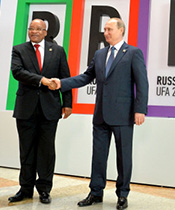 |
South Africa’s Bizarro-World Foreign PolicyBy J. Peter PhamLast year, when it was first reported that South Africa’s ruling liberation movement, the African National Congress (ANC), would receive funding from the Chinese Communist Party for its new Policy School and Political Institute in Venterskroon, I and several other scholars—including Patrick Heller of Brown University and retired Ambassador David Shinn of George Washington University—drew more than a bit of criticism over our concerns that, as I told Time magazine, “Chinese money in significant amounts and influence could tip the ANC in the wrong direction.” As it turns out, it took less than a year for proof to emerge of just how much the foreign policy orientations of Africa’s second-largest economy have shifted. [READ MORE] |
Burundi: Dust Settles After Parliamentary ElectionsBy Kelsey LilleyBurundi, the central African nation entering its third month of political crisis, held parliamentary elections last week. Seventeen opposition parties formally boycotted the polls (though several others appeared on the ballot); preliminary results suggest that the ruling party of incumbent President Pierre Nkurunziza—whose announcement that he would seek a third term sparked widespread protests—won a large majority of parliamentary seats. [READ MORE] |
|
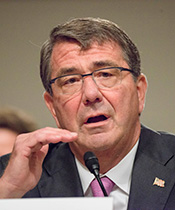 |
What if There Had Never Been a Joint Strike Fighter? (Part 1)By James HasikThis month, the US Marine Corps declared that its first squadron of F-35Bs had reached “initial operating capability”. That’s 21 years after the program first began as the Joint Advanced Strike Technology (JAST) program, 18 years after the first Joint Strike Fighter (JSF) design contracts were awarded, and yet 13 years after Lockheed Martin won the development contract for the F-35 Lightning II, way back in October 2001. It’s notable that a war started the month prior to that award. Perhaps it’s intriguing to ask what might have happened if that contract had never been signed—if, perhaps, the Pentagon had gone all-in supporting the fighting in Afghanistan (and later Iraq), and found some other solution for backfilling its aging fighter fleets. [READ MORE] |
